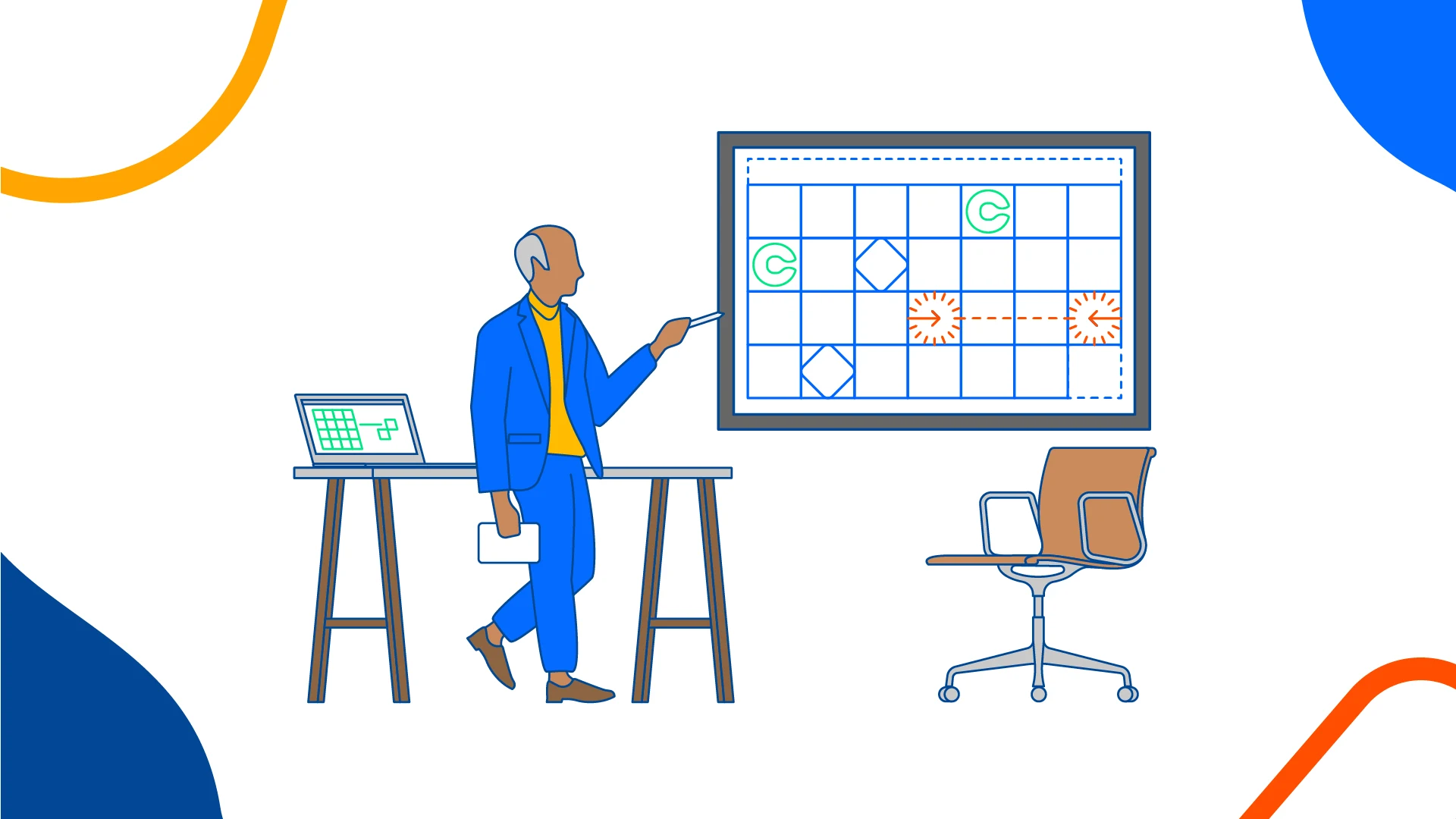Table of contents
Interview scheduling may seem like a relatively minor part of the hiring process. But it can have a dramatic impact on both the candidate experience and your hiring team. In a Calendly survey, 78% of recruiting professionals say they’ve lost a candidate because they couldn’t schedule interviews quickly enough.
The right interview scheduling system can help hiring managers and job candidates shine, streamline your team’s workflow, and reduce the hassle in filling interview slots. Most importantly, it can create a more successful interview process that empowers your team to hire the right people.
Here, we’ll cover the key things to consider when setting up your team’s interview schedule, including gathering a strong interviewer pool, sending calendar invites right away, letting candidates self-schedule, and preparing for changes.
Build a strong pool of interviewers
The wider your interviewer pool, the more scheduling options you’ll have. There are many benefits to having plenty of interviewers to choose from.
Different roles require different types of expertise. After all, the skills needed to succeed in HR are quite different from what the IT department needs. In addition, you need diverse hiring panels to prevent unconscious biases.
To build your interviewer pool, look at team members in terms of their department, time zone (for remote interviews), experience level, personality type, and so on. You should also be mindful of each individual’s workload. Some individual and departmental roles, such as engineering, require more focus time than others. This should be factored into your decisions when figuring out interview load balancing.
Develop a set of standard questions or skills assessments to ensure fair and consistent treatment of each candidate — and to ensure you get substantive, informative responses that help your team make the right hire.
Providing interview training to more of your staff gives you more scheduling options. This allows you to widen the pool of interviewers who are qualified to meet with candidates. This also ensures that interviewing expertise is present across various departments in your company. If more people are trained, it’s also easier to find an interviewer substitute at the last minute.
Send calendar invites ASAP
In today’s extremely competitive job market, hiring managers can’t afford to wait to schedule interviews. Calendar invitations should be sent to the candidate and all interviewers as soon as possible. This avoids someone getting double-booked, which could force you to reschedule.
The confirmation email should have all necessary information for the candidate and interviewers. This includes the position they are interviewing for, who they will be meeting with, whether the interview will be conducted remotely or in-person, and any materials they may need for the interview. Let candidates know how long the interview should take so they can plan accordingly. Providing additional contact options (such as a phone number) can also help candidates if they need to get in touch with you quickly.
Preparing an email template is a great way to simplify this process. Instead of writing your emails from scratch for each interview, you can save time by filling in relevant details in a pre-written email. This also makes you less likely to forget including any important information.
Your interview scheduling software should automatically add the interview to your team’s calendars. Notifications sent before the interview will remind them to prepare for the meeting by looking over the applicant’s resume or portfolio — or simply to get to the meeting on time.
E-book: The ultimate guide to recruiting coordination
Let candidates self-schedule
Allowing candidates to self-schedule through your scheduling platform can make it easier to coordinate interview times by eliminating the back and forth of scheduling via email. Your system should be set up to automatically send calendar invites after a candidate selects the best time for them.
Your scheduling platform should be easy for candidates to access and use. For example, displaying a list of available times makes it easy for candidates to find the time that works best for them.
A scheduling tool that integrates with the technology software coordinators and candidates already use will make calendar invites more effective. Sometimes, simply adding the interview to a candidate’s Google Calendar is enough to help a candidate remember their appointment.
Consider when interviewers are most energized
The time of day and day of the week when someone is interviewed can actually affect their chance of getting the job. For example, research has found that mid-morning interviews generally have more positive results.
In the early morning, interviewers may be distracted by checking email or other tasks. By the late afternoon, they’re thinking about what they’ll do when they get home at the end of the day. Mid-morning is when many people are most focused. Tuesday through Thursday are considered better days for candidates to interview for similar reasons.
You can’t control every aspect of your recruiting team’s schedule. But you can be mindful of how scheduling several interview time slots back-to-back or late in the day could negatively affect the applicant (and interviewer) experience.
Evenly distributing interview loads can help protect your interviewers from burning out and becoming frustrated with the process.
Prepare for the unexpected
Even with the best-laid plans, you can’t count on everything always working out. A candidate (or interviewer) might show up late, or an interview could run 15 minutes over schedule.
Time spent waiting can add up faster than you might expect. The average company interviews six to 10 candidates for a job, with many people going through several rounds of interviews including phone screens and panel interviews.
Without proactive planning, an interview that runs long could result in the next candidate’s time getting cut short. Or, a series of interviews that run long could result in the last interview for the day starting an hour late. This doesn’t create a good impression with top talent.
No matter how many interviews you have planned for the day, it’s best to create a half-hour buffer between interviews. This gives your team more flexibility in case an interview runs long. It may also give them time to submit their feedback about the candidate they just met, and clear their heads for the next person.
Collecting data on your interview process can help you identify potential room for improvement. Reporting on that data to recruiting operations leaders or other key decision-makers within the company is essential for enacting change and improvement. For example, digging deep into your data can tell you why you’re having high numbers of interview declines, no-shows, or other issues. Proactively learning about these issues will make your ability to schedule interviews more effective in the future.
Build a stronger interview schedule with Calendly
A quality interview schedule will help you save time and make your talent acquisition process easier and more fair and effective. When each candidate has a job interview at a time that works for them, you can deliver a better experience that makes it easier to land top talent.
Calendly’s scheduling automation platform helps recruiters coordinate interviews in just a few clicks, cutting down on time-consuming email back-and-forths — whether it’s a group interview or one-on-one. A study conducted by Forrester Consulting found that enterprise recruiting teams achieved a 26% shorter recruiting cycle with Calendly.
Integrations with other apps you already use, such as Zoom and Greenhouse, further streamline the scheduling process. Whether coordinating onsite or video interviews, Calendly will help you deliver a positive experience that strengthens your brand. A successful, person-focused candidate experience will help your brand stand out so you can get the best talent available.
Ready to see what scheduling automation can do for your recruiting team? Learn more about Calendly's recruiting solutions, or dive right in with a free trial.
Get started with Calendly
Sarah Henning
Sarah is a Managing Editor at Calendly, the perfect home for her obsession with words and compulsion to organize. Hobbies include spoiling her rescue dog and soaking up Nashville's live music scene.
Related Articles
Don't leave your prospects, customers, and candidates waiting
Calendly eliminates the scheduling back and forth and helps you hit goals faster. Get started in seconds.
Calendly eliminates the scheduling back and forth and helps you hit goals faster. Get started in seconds.

